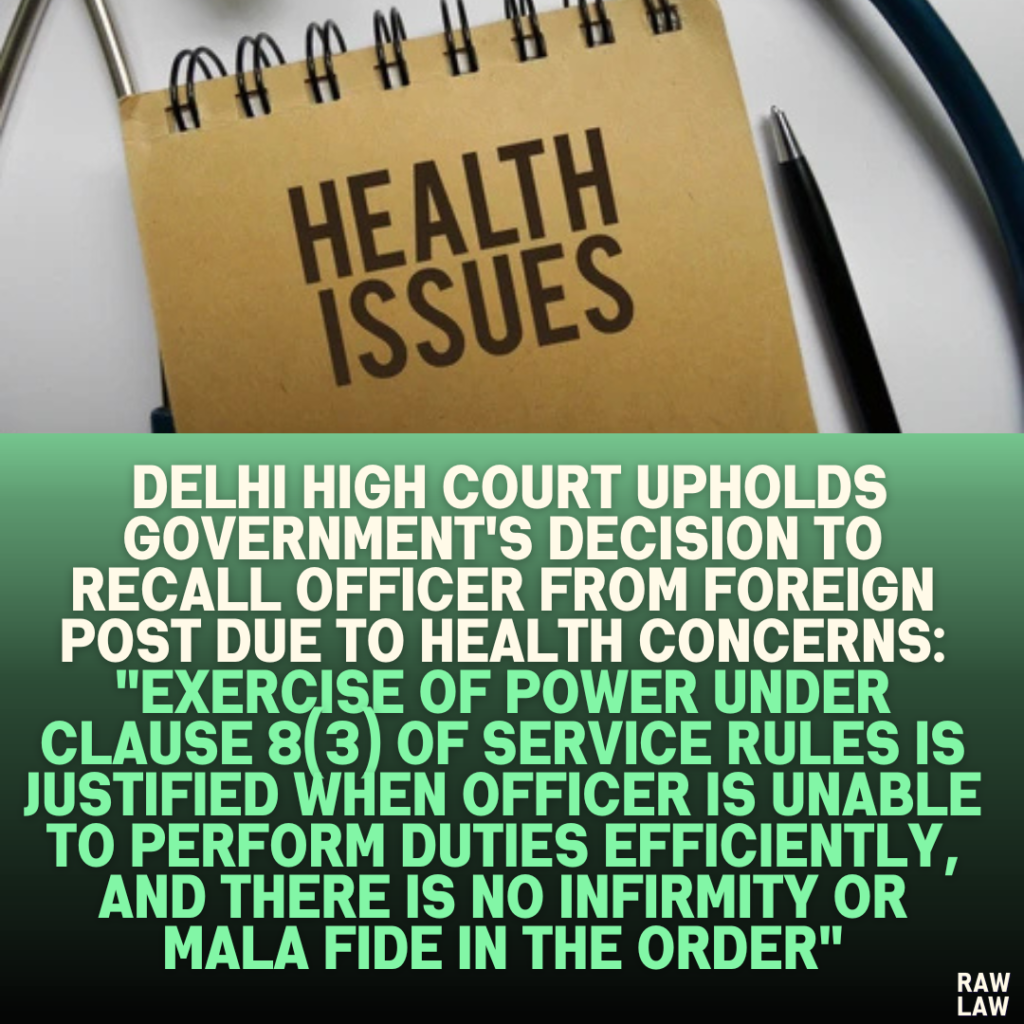Court’s Decision:
The Delhi High Court dismissed the petitioner’s challenge to an order by the Central Administrative Tribunal (CAT), which upheld his recall from a foreign posting to the headquarters in New Delhi. The court ruled that the recall order was validly issued under Clause 8(3) of the Indian Foreign Service (Pay, Leave, Compensatory Allowance, and other Conditions of Service) Rules, 1961. The court emphasized that the petitioner’s medical condition and lack of proper healthcare facilities in his foreign posting location necessitated the recall, making it a reasonable and bona fide administrative decision.
Facts:
- The petitioner, an officer in the Ministry of External Affairs since 1996, was transferred to the Consulate General of India (CGI), Birgunj, Nepal, on July 21, 2024.
- Shortly after his transfer, the petitioner developed severe health issues, including liver cirrhosis and elevated creatinine levels, indicating kidney problems. This led to his inability to attend office from August 22, 2024.
- Due to the lack of adequate medical facilities in Birgunj, a small town, he sought leave to return to India for treatment. His request was initially delayed, prompting him to escalate the matter to higher authorities. He was granted leave for treatment in India.
- While on leave, the petitioner faced a recall order dated October 11, 2024, transferring him back to the headquarters in New Delhi.
- Dissatisfied with the recall, he approached the CAT, arguing that the order was arbitrary and in violation of service rules. The CAT dismissed his application, prompting him to file the present writ petition.
Issues:
- Was the recall order issued by the government arbitrary or mala fide?
- Did the government correctly invoke Clause 8(3) of the service rules in recalling the petitioner?
Petitioner’s Arguments:
- Misapplication of Rules: The petitioner argued that Clause 8(3) of the service rules permits recall only under two conditions:
- The officer is unable to perform duties efficiently.
- The medical expenses incurred or likely to be incurred are unduly large. He contended that neither condition was satisfied, as he was capable of performing his duties and no undue medical expenses had been incurred by the government.
- Discriminatory Treatment: The petitioner highlighted instances of other officers with severe medical issues who were not recalled. He argued this demonstrated unfair and discriminatory treatment.
- Delay in Approving Leave: He pointed to the delayed processing of his leave application as an example of the hostile and unprofessional treatment he received.
Respondent’s Arguments:
- Health Concerns: The respondents highlighted that the petitioner’s medical condition, which included liver and kidney diseases, significantly compromised his ability to work effectively in a foreign post.
- Lack of Medical Facilities in Birgunj: They argued that Birgunj lacked proper medical facilities, making it unsuitable for an officer with significant health challenges.
- Administrative Necessity: The recall was presented as an administrative decision made in the petitioner’s best interests to ensure his health and operational efficiency.
Analysis of the Law:
- Clause 8(3) of the Service Rules: This provision empowers the government to recall an officer if:
- They are unable to perform their duties efficiently due to health or other reasons.
- The medical expenses incurred or likely to be incurred are unduly large.
- Judicial Review of Administrative Decisions: The court reiterated that judicial interference in administrative decisions is limited to cases of mala fide intent, arbitrariness, or violation of principles of natural justice. None of these were found in the present case.
Precedent Analysis:
The court did not rely on specific precedents but followed established principles of administrative law, emphasizing deference to administrative discretion unless it is shown to be arbitrary or mala fide.
Court’s Reasoning:
- Health and Efficiency: The court acknowledged that the petitioner’s health conditions severely impaired his ability to perform duties efficiently, justifying his recall under Clause 8(3).
- Lack of Facilities: It noted that Birgunj, being a small town in Nepal, did not have adequate medical infrastructure, which necessitated the petitioner’s relocation for proper care.
- No Mala Fide Intent: The court rejected the claim of discriminatory treatment, holding that the decision was based on medical and administrative considerations.
Conclusion:
The court upheld the CAT’s dismissal of the petitioner’s challenge, finding no infirmity or mala fide intent in the recall order. It ruled that the government’s action was reasonable and aligned with service rules. The petition was dismissed.
Implications:
- Administrative Discretion: The judgment affirms the government’s authority to make administrative decisions, such as recalling officers, when justified by health or efficiency concerns.
- Health Considerations in Foreign Postings: It highlights the need for robust medical infrastructure at foreign postings and underscores the importance of factoring health issues into personnel decisions.




Pingback: Delhi High Court Grants One-Month Interim Bail Extension to Convict Under POCSO and IPC for Medical Recovery Amidst Concerns Over Victim Safety and Non-Compliance with Bail Conditions - Raw Law
Pingback: Supreme Court Reaffirms Jurisdictional Limits of High Courts Under Article 226: Restores Findings Declaring Disputed Land as Pond and Protects Community Resources - Raw Law
Pingback: Supreme Court: Central Government Must Finalize Cashless Treatment Scheme for Motor Accident Victims to Protect Right to Life During the "Golden Hour" Under Section 162 of the Motor Vehicles Act - Raw Law